Vietnam Business
RECAP 2024 NCKU OVERSEAS WEEK - WEBINAR “INNOVATIONS AND SUSTAINABLE ECONOMIC DEVELOPMENT STRATEGIES IN THE DIGITAL AGE: NAVIGATING CHALLENGES AND OPPORTUNITIES”
2025-01-17

2024 NCKU OVERSEAS WEEK - WEBINAR “INNOVATIONS AND SUSTAINABLE ECONOMIC DEVELOPMENT STRATEGIES IN THE DIGITAL AGE: NAVIGATING CHALLENGES AND OPPORTUNITIES”

With the aim of fostering a robust academic network between National Cheng Kung Univ. (NCKU) and Southeast Asia, NCKU Overseas Hub in Vietnam (NCKU OH) in collaboration with sister Hubs in Thailand and Malaysia, organized the annual “2024 NCKU Overseas Week” Webinar. This event showcased significant research achievements across various fields, emphasizing innovations and sustainable economic development strategies in the context of rapid digital transformation.
.png)
Viewer’s Occupation of the Webinar
The Webinar titled "2024 NCKU Overseas Week – Innovations and Sustainable Economic Development Strategies in the Digital Age: Navigating Challenges and Opportunities" took place on December 10th, focusing on the rapid digital transformation and its implications. This event highlighted the significant potential of cutting-edge technologies and digital advancements to drive innovation in economic development, enhancing productivity, efficiency, and competitiveness. However, it also addressed the challenges associated with digital transformation, such as job displacement, the digital divide, and concerns over data privacy and cybersecurity. To effectively navigate these issues, it is crucial to implement strategies that mitigate risks while maximizing the benefits of digitalization. The digital age offers opportunities like new business models, expanded market access, and improved connectivity, which can propel sustainable economic growth. Ensuring that these advancements are inclusive and accessible to all segments of society is vital for reducing disparities and fostering equitable growth, thereby creating a more resilient economy that fully harnesses the potential of digital innovation for everyone. The Webinar has drawn a wide range of occupations, including 40% Undergraduate Students, 26% Graduate Students, 26% University Staff, 6% Industry and 2% Hospital.
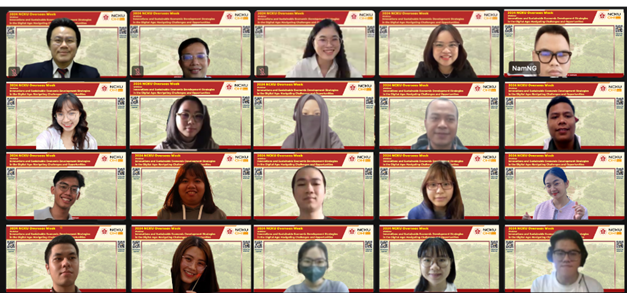
Group photo
With the desire to bring critical insights to participants, the Webinar featured a panel of experts from Economic and business fields: Moderator Dr. Ngo Thi Minh Hien (Director of NCKU Overseas Hub in Vietnam); Dr. Ha Quang An (Program Director of School of International Business, University of Economics Ho Chi Minh City – UEH); Dr. Do Thi Hai Ninh (Marketing Program Director, College of Business - School of International Business - Marketing, UEH); Dr. Andree E. Widjaja (Dean of Faculty of Information Technology, Universitas Pelita Harapan, Indonesia). Besides the research presentation from Speakers, the Q&A sessions also engaged the learning curiosity of the audience.
At the beginning of the Webinar, Dr. Minh Hien introduced Speakers and she gave thanks to all the audience who joined that day. Dr. Minh Hien expressed the importance of the role of Sustainable Development in this era, especially in developing countries and hoped participants could benefit from new methods, knowledge and specific case studies from the Speakers.
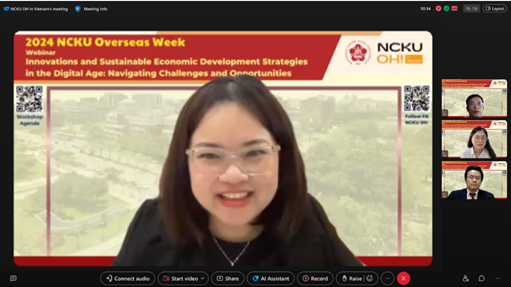
Dr. Minh Hien at the Opening Remark
The first presentation was the topic “Unveiling the role of sustainability practices, co-innovation and entrepreneurial orientation on SMEs performance: An empirical study in developing country” which was executed by Dr. Do Thi Hai Ninh, highlights the urgent need for SMEs to adopt sustainability practices in response to climate change. The emergence of climate change calls for the high-intensity adoption of sustainability practices in all business actors, especially SMEs. While SMEs constitute a significant proportion of businesses worldwide and are key drivers of economic growth and employment. The study raises two main questions about how sustainability practices influence SMEs' openness to co-creation and entrepreneurial orientation, as well as the influence of co-creation and this orientation on innovation implementation and firm performance.

Dr. Do Thi Hai Ninh shared the topic “Unveiling the role of sustainability practices, co innovation and entrepreneurial orientation on SMEs performance: An empirical study in developing country”
Next, Dr. Hai Ninh also highlighted the important implications of this study. Theoretically, the study not only confirms the validity of the Natural Resources-based View (n-RBV) theory in the context of developing countries but also expands the literature on sustainable practices in small and medium-sized enterprises (SMEs). Practically, SMEs are encouraged to adopt sustainable practices to improve performance, while policymakers need to provide support through subsidies and financial support to promote sustainable development in this sector.
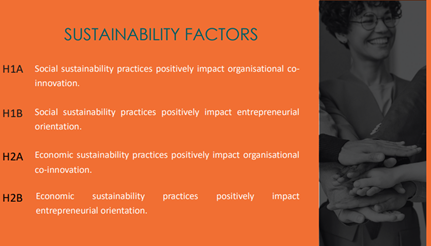
Dr. Do Thi Hai Ninh shared the topic “Unveiling the role of sustainability practices, co innovation and entrepreneurial orientation on SMEs performance: An empirical study in developing country”
In addition, Dr. Ninh also presented a series of hypotheses related to the interaction between innovation factors and SMEs performance. Hypothesis H3 states that organizational innovation has a positive impact on technological innovation. Next, H4A and H4B both emphasize that entrepreneurial orientation not only has a positive impact on organizational innovation but also on technological innovation. Finally, hypothesis H5 asserts that technological innovation has a positive impact on SMEs performance. These hypotheses provide a theoretical framework for studying the role of innovation in enhancing the competitiveness of SMEs.
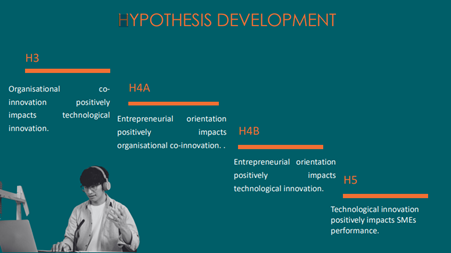
Dr. Do Thi Hai Ninh shared the topic “Unveiling the role of sustainability practices, co innovation and entrepreneurial orientation on SMEs performance: An empirical study in developing country”
The paper affirms the Natural Resources-based View (n-RBV) theory in the context of developing countries and expands the literature on sustainable practices in small and medium-sized enterprises (SMEs). It emphasizes that SMEs should adopt sustainable practices to improve performance, and calls on policymakers to provide subsidies and financial support. The conclusion shows that technological innovation and innovation outcomes can be improved through collaboration and entrepreneurship orientation, with the effect of technological innovation on SMEs performance confirmed in this context.
After the presentation ended, a series of questions were raised, such as: What is the most important factor for SMEs to develop sustainably, especially in this era? Is there any difference in SME strategies between developing and developed countries? Could you please introduce strategies for SMEs in Vietnam to increase competitiveness? What difficulties do SMEs face at this time, and how can they overcome them?
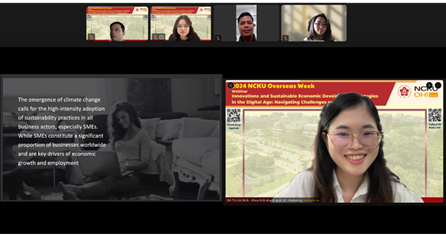
Dr. Do Thi Hai Ninh shared the topic “Unveiling the role of sustainability practices, co innovation and entrepreneurial orientation on SMEs performance: An empirical study in developing country”
Following that Dr. Andree E. Widjaja introduced his presentation on the topic "Using Generative AI for Research: Is it Fine?". He began by posing fundamental questions about artificial intelligence (AI), such as what AI is, its primary applications, and its overall impact on scientific research-whether beneficial or detrimental.
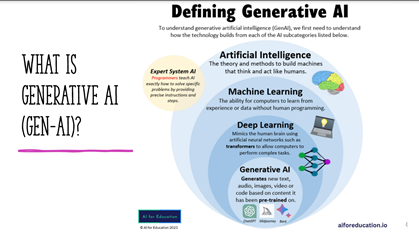 Dr. Andree E. Widjaja demonstrated his study “Using Generative AI for Research: Is it Fine?”
Dr. Andree E. Widjaja demonstrated his study “Using Generative AI for Research: Is it Fine?”
In his discussion, Dr. Andree highlighted both the advantages and disadvantages of utilizing AI tools like ChatGPT in scientific research. On the one hand, Dr. Andree noted that AI can significantly enhance productivity by streamlining data analysis, generating ideas, and assisting in literature reviews. These capabilities can expedite the research process, allowing scholars to focus on more complex analytical tasks. On the other hand, Dr. Andree cautioned against potential pitfalls, such as the risk of generating inaccurate or misleading information and the ethical implications of relying too heavily on AI-generated content.
To support his points, Dr. Andree provided examples of AI applications that cater to various research needs, illustrating their practical utility in academic settings. Dr. Andree emphasized the importance of selecting appropriate tools to enhance research quality rather than compromise it. Furthermore, he presented instances of reports that failed to meet scientific standards due to improper use of AI, underscoring the necessity for researchers to remain vigilant and discerning when integrating these technologies into their work.
After Dr. Andree's presentation, several challenging questions emerged. These included inquiries about “Could you please analyze the risk assessment of the AI may cause in the Research? What is the most accurate AI for research information? In your opinion, is AI good or bad for the researcher? Do students who do not utilize AI tools encounter a significant disadvantage in their studies? How do you view the fact that Professors require more work from students in light of advancements in AI and other technological aids? etc.”
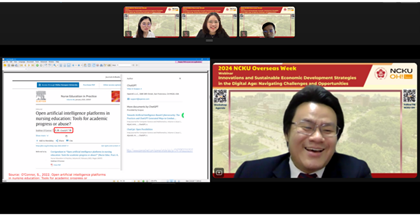
Dr. Andree E. Widjaja demonstrated his study “Using Generative AI for Research: Is it Fine?”
Finally, the topic “The Impacts of Supply Chain Social Sustainability on Supply Chain Performance, The Case of Vietnam” was presented by Dr. Ha Quang An. The research on "The Relationship Between Social Sustainability Practices and Performance Outcomes in Supply Chain Management: The Case of Vietnam" explores how social sustainability practices impact supply chain performance in medium and large enterprises in Vietnam. The study emphasizes the roles of both supplier and customer performance in this relationship, highlighting the critical importance of social sustainability in enhancing overall business outcomes.
Dr. Ha Quang An emphasized that social sustainability practices are increasingly vital for businesses in Vietnam, particularly as the country serves as a manufacturing hub for global brands such as Intel, Apple, and Nike. The study identifies key challenges faced by Vietnamese enterprises, including low wages, unsafe working conditions, and issues related to gender inequality. These challenges significantly impact not only the welfare of workers but also the reputation of firms.
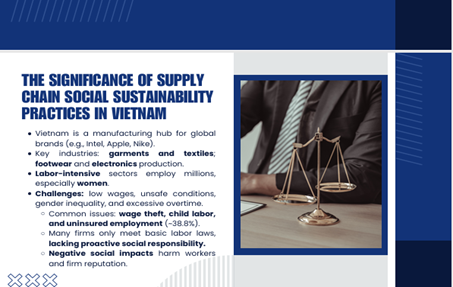
Dr. Ha Quang An shared the topic “The Impacts of Supply Chain Social Sustainability on Supply Chain Performance, The Case of Vietnam”
Moreover, the research highlights that social sustainability is not merely a trend but a commitment that businesses must integrate into their core strategies. With 90% of companies globally shifting towards sustainable practices, the study points out that enhancing social sustainability can lead to improved supplier and customer performance, which ultimately boosts overall supply chain performance. Collaboration among stakeholders is crucial, as it fosters stronger relationships and shared values, benefiting both the business and the community.
Dr. An concluded by urging businesses to implement effective social sustainability practices to address systemic issues and improve employee welfare. He also called for policymakers to strengthen frameworks that support sustainable development, ensuring that companies can thrive while contributing positively to society. This comprehensive approach not only aligns with the United Nations' Sustainable Development Goals but also positions Vietnamese enterprises for long-term success in the competitive global market.
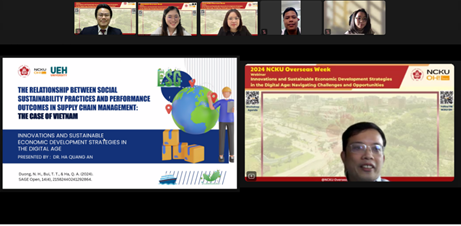
Dr. Ha Quang An shared the topic “The Impacts of Supply Chain Social Sustainability on Supply Chain Performance, The Case of Vietnam”
The Webinar was streamed on Webex Cisco and Facebook livestream of NCKU OH and 721 viewers from various countries, including Vietnam, Thailand, Taiwan, Philippines, Paraguay, Malaysia, Indonesia, and India. The feedback from the speakers and participants was very favorable. Participants enjoyed the diversity and expertise of the panelists, the clarity and relevance of the content, and the opportunity to network and exchange ideas with other professionals, according to the post-webinar survey.
NCKU OH thanks all supporters from communities on Facebook that spread out the webinar: NCKU Overseas Hub in Thailand, NCKU Overseas Hub in Malaysia, VietPhD.org, VSATW, HUET’s Facebook Fanpage, Free Webinars, Học bổng du học Đài Loan, Free Live Webinar, etc.
Keyword: